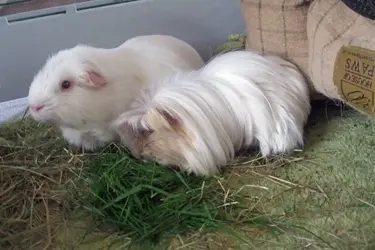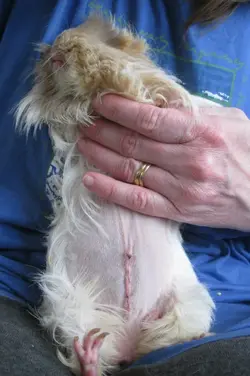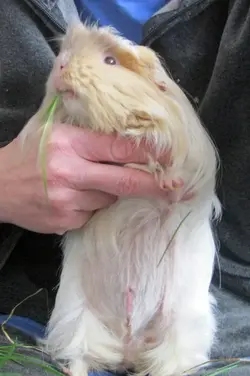Leeni
Junior Guinea Pig
So my both smooth coated girls Hupakko and Tyllerö (they are sisters) were diagnosed with ovarian cysts 1st of December. Edit. oops sorry, Tyllerö was diagnose already some time in autumn!
Tyllerö's cysts are relatively small but they cause her to bully and stress out others. The injections help her but only for a couple of months then I have to take her to vet's again. Or that is what I think, December was the second time we treated the cysts. Vet says that I could have her operated to remove cysts if she bothers others too much. But since injections help with the behavior issues I'm hesitant to have her operated because operating is of course risky. My question with her is how many times and how often can the injections be given?
Hupakko was taken to vet's for the first time because of the cysts. Her right ovary is huge, it's over the size of a tennis ball and I think it has grown a bit since. Also left is about the size of a golf ball. The cysts however don't affect her behavior and neither of the girls have lost any hair on their sides or anywhere else. Because of her normal behavior vet said that it is not necessary to sterilize her if she can move about all right and does not lose weight too much which would be a sign of a hormonal stress.
I am just worried about her front paws which are starting to be in an awkward position because of her weight. I don't want her to end up with inflammation in joints or something. She is now 1448g and Tyllerö is 1204g which would be a good weight for Hupakko, too. I estimate that the cysts weight a way over 100g maybe even 200g so she has much to carry.
So my question is should I have her operated at some point anyway? How large can the cysts grow and can they have a long term effect on her? Or is it safer not to operate? I have heard of many cases where recovering from of this kind of surgery hasn't gone too well.
Tyllerö's cysts are relatively small but they cause her to bully and stress out others. The injections help her but only for a couple of months then I have to take her to vet's again. Or that is what I think, December was the second time we treated the cysts. Vet says that I could have her operated to remove cysts if she bothers others too much. But since injections help with the behavior issues I'm hesitant to have her operated because operating is of course risky. My question with her is how many times and how often can the injections be given?
Hupakko was taken to vet's for the first time because of the cysts. Her right ovary is huge, it's over the size of a tennis ball and I think it has grown a bit since. Also left is about the size of a golf ball. The cysts however don't affect her behavior and neither of the girls have lost any hair on their sides or anywhere else. Because of her normal behavior vet said that it is not necessary to sterilize her if she can move about all right and does not lose weight too much which would be a sign of a hormonal stress.
I am just worried about her front paws which are starting to be in an awkward position because of her weight. I don't want her to end up with inflammation in joints or something. She is now 1448g and Tyllerö is 1204g which would be a good weight for Hupakko, too. I estimate that the cysts weight a way over 100g maybe even 200g so she has much to carry.
So my question is should I have her operated at some point anyway? How large can the cysts grow and can they have a long term effect on her? Or is it safer not to operate? I have heard of many cases where recovering from of this kind of surgery hasn't gone too well.



